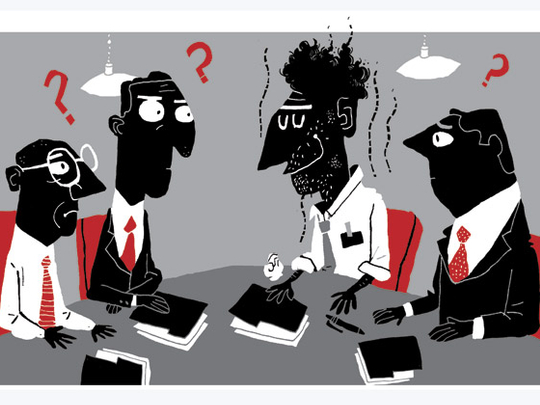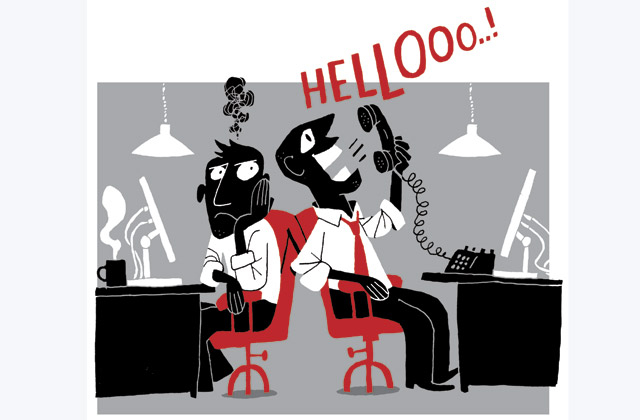
Every workplace has its share of difficult people. Whatever the temperament of a tricky colleague, the bottom line is they can make your work life miserable and pose a serious challenge to your emotional wellbeing. However, all is not lost. For every prickly tactic your crusty co-worker may employ to trip you up, there is a way to neutralise it.
New York-based Newsday reporter Carrie Mason-Draffen has developed solutions based on the most common issues people face in the workplace. Her book, 151 Quick Ideas to Deal With Difficult People, gives you strategies on how to protect yourself and fight back in situations that may otherwise leave you licking your wounds. Each difficulty is dealt with as a chapter.
In an exclusive interview with Friday, she talks about her book and how she wrote it.
What led you to write this book?
The story behind the book is a story about me getting a lucky break. I was trying to get a book I had written on career building published. But it kept getting the pink slip. Finally a book publisher in New Jersey wrote back asking if I'd be interested in writing a book for their 151 series and that's how I wrote 151 Quick Ideas to Deal With Difficult People. I love writing and reading self-help books. I hope to write many more. I think there is hunger for these books as pressures in the workplace become greater.
What is your take on difficult people? Do cultural differences have any impact?
Being a difficult person has nothing to do with culture whatsoever, I believe. It has to do with how emotionally insecure a person is. Emotionally secure people relate well to others. They're less likely to take things personally and imagine a conflict where none exists. But many people are emotionally insecure because of their upbringing. They suffer from low self-esteem because their parents were hypercritical of them as children. Or, at the other extreme, they feel entitled because their parents indulged them all the time. Either group of people can be difficult in the workplace.
In my book, I have presented an example of such a sense of entitlement I experienced. When I was very busy meeting a deadline, a colleague walked up to me asking me to view her vacation pictures. I told her I'd look at them after deadline. About 20 minutes later she came back to ask if I was ready. Again I said I wasn't and promised to look at them when I got off deadline. Her behaviour did not upset me because I could see that she was operating from a sense of entitlement. I had to say, 'Not now'.
Do all difficult people possess a similar trait? If yes, what is it?
It's hard to say because difficult people run the gamut. But if I were hard pressed to find some common ground it would be that they are closed-minded, meaning they aren't open to looking at a tense situation from a different perspective. They see life in one way and that is the only way as far as they are concerned.
Is being difficult an attitude, a habit or an embedded trait?
It is learnt behaviour. I am convinced that we aren't born difficult. I've read about research that has established that young children are quick to come to the aid of another child who is sad. So it is obvious that we are naturally endowed with compassion but unlearn that important lesson because of childhood influences and their impact on our adult outlook.
Do colleagues, bosses and peers have a role to play in turning someone difficult?
Sometimes they are responsible. If a boss always criticises workers and never offers praise, those workers may not be inspired to do their best at work. And they may resent being asked to do certain things. But no one will remember that their boss's mistreatment made them difficult.
Can this be a blame game at times to deflect from the real workplace issues?
It is important to try to figure out the cause of a certain behaviour because then you can respond more effectively to it and are less likely to take it personally.
Can you give us an example?
I once had to ask a co-worker to lower her voice so that I could conduct a telephone interview. She became angry and said, “Well, you aren't quiet when I talk on the phone.” So I took a deep breath and said, “If I am ever noisy when you are on the phone, ask me to be quiet.” Then I told her what I needed to do that was so important. And I concluded saying, “But for now I need you to keep your voice down.” That worked. I was firm but not nasty as she was.
Do you think organisations pay a huge price on efficiency due to 'difficult' people?
Difficult people can kill your business. That is why companies should take employee morale seriously. I have spoken with difficult receptionists at companies I called for interviews. They weren't interested in taking messages and didn't care that a reporter wanted to interview the company owner. So I passed and contacted other companies.
Are there any best practices for companies to follow to identify and deal with difficult people?
Yes. Be observant and notice how your employees treat one another. But if the person is difficult, chances are they will be difficult with the boss too. Supervisors should try to stop the difficult behaviour. If the employee is always late, or insubordinate, the supervisor should talk to the person. If the employee doesn't change then the person should be put on notice that he or she has to change their ways or find another job.
Difficult people at the workplace
Friday asked our facebook fans who they thought were the most difficult people in the workplace. Renita Brammadas, Amy Kahn, Xenia Castelino, Shiuli Lara Dutt, Tina Sujith Mathew, Mona Abbas, Phil Bedford and Carol Talbot posted their comments, which we sent to Alaa Abu Ali, counselling psychologist at Synergy Integrated Medical Centre, Dubai, to be analysed. Here are the kinds of difficult people and Abu Ali's suggestion on how to deal with them.
The micromanager
The effect: Dealing with a micromanager can be frustrating. Research has shown it can decrease morale in the workplace. Most individuals allow micromanagers to continue, therefore sending a message that it is OK or that help may be needed. Reinforcing their micromanaging may make them feel like they are helping rather than being difficult.
The strategy: When dealing with a micromanager it is important to be patient and focus on communication. Through honest communication, you can express your desire for more independence and less management. At times, a micromanager may not even know that he or she is affecting the other person. Through communication and more independence you can prove that you are capable of taking control and completing the task at hand. You may not be able to change the micromanager, however, it is important to focus on how to improve the situation and manage him/her. Let the person know that you appreciate their help, but you will ask them for help only when you need it.
The stubborn one
The effect: Stubborn people, whether they be bosses, peers or subordinates, are actually wise. They are shrewd enough to know that their stubbornness will keep subjugates within their boundary. It's a tactic to keep one's chair warm. You may feel that you are in a position that doesn't allow you the freedom to be creative and or take control. Having a stubborn co-worker may result in you not being able to listen or hear their ideas.
The strategy: The first step in dealing with a stubborn co-worker is to ensure that their nature doesn't interfere with your ability and or creative capabilities. Keep an open mind and try to compromise to find a place where are able to express your ideas openly without fear. In dealing with a stubborn co-worker, you need to be firm at all times. However, avoid getting angry as this will only exacerbate the situation.
The my-opinion-is-the-only-one-that matters manager
The effect: When a superior compels a person to perform a task without considering their opinion you may feel that your opinion doesn't matter or that he or she is being inconsiderate. If this becomes a pattern, it is important to not let it linger and take over your ability to perform in the workplace.
The strategy: You can start by communicating your concern in a professional manner. If you don't express your concern, your manager may not realise that you have a differing opinion or he may conclude that your opinion is not important. When expressing your opinion, maintain a professional attitude and don't overstep professional boundaries.
The hypocrite
The effect: You feel betrayed or bullied.
The strategy: First, it is important to maintain boundaries in the relationship and ensure that the individual is considered a co-worker rather than a friend. Establishing a professional relationship is vital and you can begin by not taking this as a personal attack, which in time can take a toll on your life. Keep your relationship at a minimal level and rather than considering the co-worker as your “enemy” treat them as a person you may need to be cautious with. Although you may not be able to control the behaviour itself, the manner in which it is dealt with is the most important. Try to identify when this happens, what are the triggers so you can be better prepared if it recurs. Try to be objective and deal with any emotional repercussions this may have on you as taking care of yourself is very importance.
The office politician
The effect: This situation – where a worker is playing dirty political games – is often difficult and results in high-level frustration and may lead to a lack of satisfaction in the work environment.
The strategy: The first step is to maintain a positive attitude and to focus on how to make the most out of the situation at hand. You may not be in control of their position in the company but you have power when it comes to dealing with the situation. If you feel the other individual is incompetent and/or insecure, you must focus on your own ability and be confident with your skills. Try to find positive qualities that he/she may have and build on them. If you think they are not doing their work, the best you can do is to try to make suggestions focusing on how you can improve the situation to the best of your ability. By shifting your attention away from their inability, you can create a healthy environment for yourself and coexist with the difficult individual.
The in-a-hurry-to-get-ahead guy
The effect: When working with individuals who want to get ahead at any cost, it can not only be frustrating but create tension and feelings of dissatisfaction in a workplace. The individual may have his/her own motives; therefore it is important to focus on your own goals and achievements.
The strategy: Maintain a healthy professional relationship with the individual and be aware of falling into a power struggle. By taking the initiative and proving yourself through your work, you can create your own measure of success even if the individual has his/her own ways of getting ahead. Try to coexist without allowing their work ethic to interfere with your success and goals. Remember not to take their actions personally but keep in mind their actions for future interactions. Try to stand out in a positive way and communicate effectively so that their actions do not impact your work ability or emotional well-being.
The blamers
The effect: We always encounter people who love to shift the blame to someone else and they can mean real trouble. They are not willing to accept another person's point of view and they believe the only right way is their way. Energy vampires, as the term suggests, sap your enthusiasm and self-esteem and make you a wary performer.
The strategy: If you are working with “energy vampires”, the most important step is to ensure they do not affect your performance or psychological well-being. Individuals may blame others rather than improve themselves to hide their insecurities and their behaviour may anger or frustrate you. Start by maintaining your boundaries to prevent yourself from getting emotionally and psychologically drained. Although this situation may induce anger, remain calm and think of ways that you can encourage the individual to take more initiative. By communicating effectively, the individual may gain awareness of their own behaviour and how it is affecting others around him/her. You can communicate your concerns by being direct but also ensuring they don't feel you're attacking them. This difficult person may be afraid of asking for help, therefore by opening communication you may be able to find ways to begin dialogue in a professional and healthy way.
The 'know-it-all'
The effect: These are the ones who prefer not to 'honour diversity in opinion. This difficult person may be considered as the “know it all”, a person who believes that he is always right and doesn't want to take other beliefs or opinions into consideration. This leaves no room for any discussion as one person's word has to be final.
The strategy: When trying to communicate with a “know it all”, begin by asking questions and providing alternatives. Let them know that you value and respect their opinion. Be a role model and show them that you can value different beliefs and opinions. You can state your points in a non-aggressive manner and try to show him that there may be many possibilities, opinions and beliefs. If he is not responsive, focus on how you can create a healthy environment for yourself and others.
The “know it all” type may actually believe he is right; therefore it's important to remain calm and show him the different options. Although this person may appear to be too rigid and unwilling to listen to differing opinions, he may actually be listening without necessarily acknowledging that other beliefs exist. When dealing with this person, try to empathise and help him understand where you are coming from and with time he may begin to appreciate or at least recognise that differing beliefs exist.
By the way...
Mason-Draffen gives five tips on how to deal with difficult people:
- Train your managers to master the art of difficult conversations.
- Know when to consult a lawyer or other experts.
- Don't let an aggressive colleague commandeer your meeting.
- Don't let difficult people set the tone for the office.
- Prepare well for a meeting with the boss.
- Do your homework.
151 Quick Ideas to Deal With Difficult People is available at Kinokunya book store at Dubai Mall














